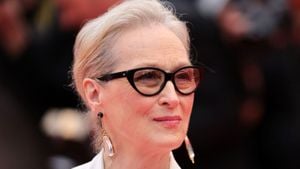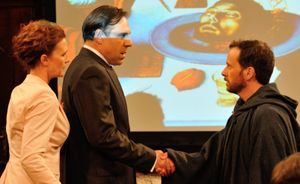Joy Reid's final episode of MSNBC's 'The ReidOut' marked the conclusion of her groundbreaking tenure as the first Black woman to host a primetime cable news show. The sudden cancellation, revealed by the network as part of a broader schedule overhaul, ignited fierce backlash from fans, fellow journalists, and advocacy groups eager to support Reid and voice their dissent.
Reid, known for her incisive political commentary and unwavering support for racial justice, closed her last show on February 24, 2025, with the poignant reflection: “When you are in the midst of a crisis, and especially a crisis of democracy, how do you resist? When fascism isn’t just coming, it’s already here.” This declaration encapsulated the essence of her work, and her commitment to holding powerful figures accountable.
The announcement of the show's cancellation came during a tumultuous time for MSNBC, which is undergoing leadership changes under new president Rebecca Kutler. Following the news, former President Donald Trump wasted no time expressing his glee on social media, labeling Reid as “mentally obnoxious” and decrying her talents, saying she “should have been ‘canned’ long ago.” Trump's remarks, rather than silencing Reid's support network, incited widespread support for her across various platforms.
The collective outrage manifested through calls to action spearheaded by groups like Win With Black Women. They encouraged viewers to tune in to Reid's last show, aiming for 15 million views, and then to turn off MSNBC altogether as part of their protest against the network's decision. During her farewell broadcast, Reid expressed gratitude for her audience and her team's efforts. “I am not sorry for what we did,” Reid affirmed, defending her coverage of significant issues, from race relations to international crises.
Throughout her five years on air, 'The ReidOut' provided not just political commentary but served as a catalyst for dialogue surrounding democracy and race. Reid's departure has left many wondering about the future representation of Black women on major networks, as studies indicate they account for only 4.5% of media jobs, contrasting sharply with their 13% share of the general population.
Reid engaged her supporters on social media following the cancellation, thanking them for their kindness during this challenging time. She said, “I just want to say thank you to everyone who has reached out with kindness and encouragement, both personally and in these social media streets.” This gratitude reflects her acknowledgment of the deep connections she cultivated with her audience over the years.
Meanwhile, fellow MSNBC personalities expressed their disappointment at Reid's exit. Rachel Maddow, Nicolle Wallace, and Lawrence O'Donnell joined Reid on-air to deliver heartfelt farewells, each emphasizing the significance of Reid’s work and her contributions to the network. “I sort of can’t get beyond” the loss of Reid, Maddow admitted, poignantly capturing the general sentiment among her colleagues.
Advocacy groups and fellow journalists have rallied to support Reid online. Journalist Nikole Hannah-Jones branded her “one of the sharpest tools” within the media, celebrating Reid's refusal to compromise her principles. Other notable figures, like Jemele Hill, also voiced support, heralding Reid as “a truth-teller” whose influence transcends her television platform.
Despite the controversy, Reid’s last episode drew considerable attention, with supporters urging viewers to commemorate her contributions by tuning in and expressing their dissatisfaction afterward. Activists circulated messages underscoring the need for greater representation for Black voices within media, asserting their commitment to taking their viewership to platforms they trust.
Looking to the future, it's uncertain what’s next for Reid. She plans to continue her journalism through social media and her Substack, promising her supporters she will remain active and engaged. “We are not going to stop,” she powerfully declared, signaling her indomitable spirit and determination to keep pushing for change.
The excitement surrounding Reid's final show demonstrates her lasting impact on the media and underlines the importance of voices advocating for marginalized communities. The show's cancellation may signify the end of one chapter, but it also sparks discussions about representation and support within the ever-evolving media industry.



